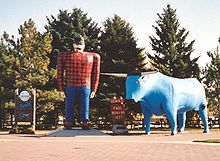- Richard Dorson
-
Richard Mercer Dorson (1916–1981) was an American folklorist, author, professor, and director of the Folklore Institute at Indiana University.
Dorson was born in New York City. He studied at the Phillips Exeter Academy from 1929 to 1933.[1]
He then went on to Harvard University where he earned his A.B., M.A., in history, and his Ph.D. degree in the History of American Civilization in 1942. He began teaching as an instructor of history at Harvard in 1943. He moved to Michigan State University in 1944 staying there until 1957 when he took a position at Indiana University as professor of history and folklore as well as that of chairman of the Committee on Folklore. He taught at Indiana until his death.[1]
When the Indiana University Folklore Institute was established in 1963 Dorson became the first director, and in 1978 he became the first chairman of the Folklore Department.[1]
Dorson has been called the "father of American folklore"[2] and "the dominant force in the study of folklore".[3] That study, according to Dorson, involved several roles; "polemicist, critic, field collector, library scholar".[4] Dorson also wrote that "no subject of study in the United States today [1976] is more misunderstood than folklore"[5].
Dorson contributed two terms to the study of folklore that have gained common currency. The first is "urban legend"; meaning a modern "story which never happened told for true".[6] Dorson also coined the word "fakelore" in a debate with author James Stevens.[7] Dorson dismissed Stevens' book on Paul Bunyan, and the later work of Ben Botkin as fakelore, or "a synthetic product claiming to be authentic oral tradition but actually tailored for mass edification", which "misled and gulled the public"[7]. Dorson's fieldwork touched upon African-American folklore in Michigan, folklore of the Upper Peninsula, other regional folklore in the United States, the folklore of Japan, and other topics. Among other academic recognitions, Dorson was awarded the Library of Congress award in History of American Civilization in 1946, and three Guggenheim Fellowships (1949, 1964, and 1971). In 2003, Minnesota State University awarded him their "Heritage Award" posthumously.[3]
Bibliography
Dorson's papers are held at the Lilly Library of Indiana University.[1] Audio recordings from his fieldwork can be found at the Archives of Traditional Music at Indiana University. In addition to his several books, Dorson also edited the Folktales of the World series, published between 1963 and 1979 by the University of Chicago Press.
- 1939: Davy Crocket, American Comic Legend
- 1946: Jonathan Draws the Long Bow
- 1950: America Begins
- 1952: Bloodstoppers and Bearwalkers (reprinted by the University of Wisconsin Press in 2008)
- 1953: American Rebels: Personal narratives of the American Revolution
- 1956: Negro Folktales in Michigan
- 1958: Negro Folktales from Pine Bluff, Arkansas, and Calvin, Michigan
- 1959: American Folklore
- 1961: American Folklore and the Historian
- 1961: Folk Legends of Japan
- 1961: Folklore Research Around the World: A North American Point of View
- 1964: Buying the Wind: Regional Folklore in the United States
- 1967: American Negro Folktales
- 1968: Peasant Customs and Savage Myths: Selections from the British Folklorists
- 1969: British Folklorists: A History
- 1971: American Folklore and the Historian
- 1972: African Folklore
- 1972: Folklore and Folklife: An Introduction
- 1973: America in Legend
- 1973: Folklore and Traditional History
- 1974: Folklore in the Modern World
- 1976: Folklore and Fakelore: Essays toward a Discipline of Folk Studies
- 1981: Land of the Millrats
- 1983: Handbook of American Folklore
Notes and references
- Dorson, Richard (1976). Folklore and Fakelore: Essays toward a Discipline of Folk Studies. Cambridge, MA: Harvard University Press. ISBN 0-674-30715-1.
- ^ a b c d Guide to the Richard Dorson papers in the Lilly Library. Indiana University. URL accessed April 22, 2006.
- ^ Nichols, Amber M. Richard M. Dorson. Minnesota State University, Mankato eMuseum. URL accessed April 21, 2006
- ^ a b Michigan State University. Michigan Heritage Awards 2003. Michigan Traditional Arts Program. URL accessed April 21, 2006.
- ^ Dorson, p. vii
- ^ Dorson, p. 1
- ^ Straight Dope Science Advisory Board. What's so urban about urban legends?. Straight Dope. URL accessed April 21, 2006.
- ^ a b Dorson, p. 5
Categories:- 1916 births
- 1981 deaths
- American academics
- American historians
- American folklorists
- Harvard University alumni
- Michigan State University faculty
- Indiana University faculty
- Collectors of fairy tales
- Guggenheim Fellows
Wikimedia Foundation. 2010.

